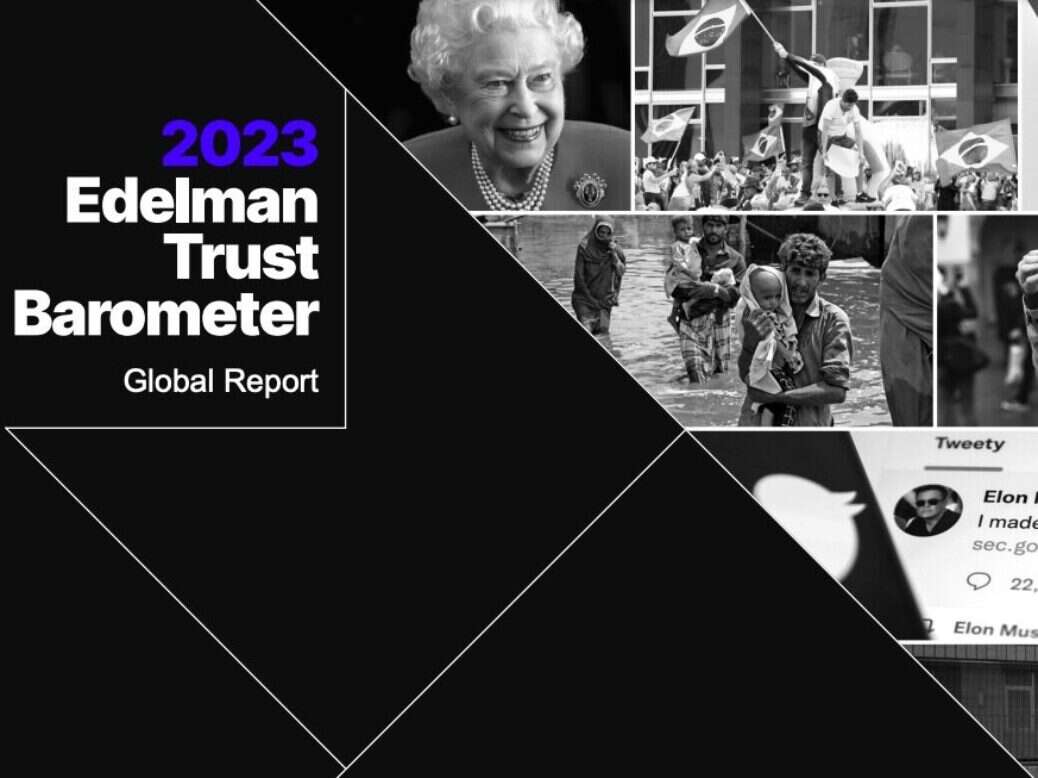
The UK and the US were just two of six countries where trust in media increased in 2022, according to the latest trust survey from PR firm Edelman.
In the UK, 37% of people surveyed in November said they trusted the media, a gain of two percentage points compared to the last survey undertaken in 2021.
However the UK remains one of the countries with the lowest faith in media – among the 27 countries surveyed on this question in the annual Edelman Trust Barometer, people were only less trusting of the news industry in Japan and South Korea.
Some 43% of respondents in the US said they trusted the media, up 4% on the previous year.
The survey contrasts with the annual Ipsos Veracity Index which in November reported that 29% of Britons trust journalists to tell them the truth (a record level).
The Edelman Trust Barometer asks participants a series of questions around issues like transparency and accountability to come up with its own predictor of trust.
China, a totalitarian state with very little press freedom, tops the survey for trust in the media.
The findings are in contrast to the previous survey where the US and the UK both saw falls in the share of people who said they had faith in the media.
In 16 of the surveyed countries fewer respondents said they trusted the media compared to the previous survey. The biggest drops were seen in South Korea, Australia, Argentina, and Malaysia. Kenya and the US reported the biggest gains.
Low levels of trust in media extended to journalists, who were among the institutional leaders people were least likely to gave confidence in.
Some 47% of people said they trusted journalists, with only government leaders scoring worse (41%). The highest levels of trust were reported for coworkers (73%) and scientists (76%).
The twenty-third edition of the annual research from Edelman surveyed 32,000 people in 28 countries via an online survey in November, including 1,150 people in the UK. Participants were asked about their levels of trust in key institutions such as government, media, business and NGOs.
This year’s report looked in depth at the issue polarisation, with company chief executive Richard Edelman noting that the cost of living crisis linked to the war in Ukraine, inflation and food insecurity has contributed to a "descent from distrust to acute polarisation in society."
One of the legacies of the Covid-19 pandemic, said Edelman, was a continuing loss of belief in media and the rise of disinformation. The media is less trusted than business, government and NGOs, the survey found.
“A shared media environment has given way to echo chambers, making it harder to collaboratively solve problems. Media is not trusted, with especially low trust in social media,” said the report.
Some 42% of people around the world said the media was a source of false or misleading information, while the same proportion said it was a reliable source of trustworthy information.
Those who felt that their country was polarised were less likely to trust the media, with 49% of those who held this view saying they trusted the media compared to 64% among those who felt their country was not divided. This echoed a similar pattern for trust in business, NGOs and government.
More people also said that journalists were a dividing force that pulls people apart (43%) than a unifying force that brings people together (35%).
Among news sources, social media was least trusted. Just over four in ten (41%) trusted social media, a fall of one percentage point compared to 2021. Canada, France and Sweden were the countries where people had least faith in news on social networks.
In contrast, search engines were thought to be most reliable, trusted by 63% of people, followed by traditional media (59%). Owned media - businesses' own communications channels - was trusted by 47% of people.
Social media was also the least trusted among broader industry sectors. Less people had faith in social media than areas such as financial services (59%) and energy (61%).
Email pged@pressgazette.co.uk to point out mistakes, provide story tips or send in a letter for publication on our "Letters Page" blog
